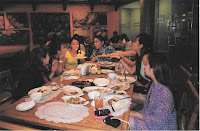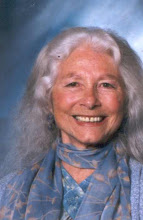It’s happening. It’s
official. The Laurel Hill Fireman’s
Fund office is moving to Lucas
Green. Tricky wording on severance
documents. Fred takes a tally of those of us resigning and those who will commute to Marin or relocate. Those of us unwilling to commute or relocate attend a job retraining seminar to help determine what position we are best suited for if we prefer not to continue with
systems analysis or commercial insurance.
Wes and I are leaving. Jerry is staying and will commute rather than
relocate. He and his partner (now
husband) just bought a house in Noe Valley.
Wes had accepted a position at Marsh & McLennan Insurance Brokers where he will head up an
in-house Fireman’s Fund Property and Casualty Insurance Company (where I eventually end up in a couple of years).
It was June, 1982.
Fred and Don set up severance interviews. Wes clued me in on a tricky question having
to do with my exit date.
“Be
careful," he warned, "Don't tell them when you want
to leave. Once they know you aren’t
staying, let them set the date. “
“Why?” I asked,
anxious to split as soon as possible; in fact after my next paycheck.
“You won’t get your severance package," he said, "because you, in
effect, quit. So it’s up to them. Again, be careful.”
I had saved some money through the company for several
years; that, along with the severance package, I’d walk away with about ten
grand- enough, I hoped to last a year and allow me to focus on my performance
art.
While on my day job, I had been working with Annette Lust who was an expert on the art of mime (Annette died in 2014 of a
massive stroke. She was 89). She had studied with the master, Etienne
Decroux, in Paris. Also, with a Ph D in
Foreign Languages from the Sorbonne, she was a French language professor at Dominican
University in San Rafael, California. She had encouraged me to volunteer to teach a night class in Beginning Mime at Dominican University, for continuing education. I got the gig and taught one night a week, taking Golden Gate Transit to Marin right after work, grabbing a bite in Cow Hollow first. Annette
had lectured at Bay Area schools and colleges on the art and history of mime ,
from early 19th Century French to Marcel Marceau to the more modern
techniques with masks and abstract physical movement. She wanted
me to join her as an unpaid assistant to illustrate her lectures with the
physicality of the art, an experience I could include on my resume when I auditioned for paying gigs.
During my years on Laurel Hill, from about 1980 to 1982, MTV launched the first 24Hr music video cable station in 1981. There was much talk about it around the proverbial water-cooler when fans rushed home after work to watch. While MTV launched its thing, the US launched the space shuttle Columbia. Its first return to space since 1975. And Sandra Day O’Conner became the first woman on the U. S. Supreme Court. Hallelujah! Bad things happened that year as well: the collapse of a hotel walkway in Kansas City, Mo where 114 people died and 200 were injured. Called “the deadliest structural collapse to occur in the US until 9/11". And between 1981-82 people became aware of scores of missing children which began with the killing of 7 year old Adam Walsh and the disappearance of 12-year-old Johnny Gosch.
Fred called me into his office. Don Pearce was there.
"What are your plans? Are you coming with us?" he asked, leaning back in his chair, arms straight, hands splayed on his desk. His tie to one side revealed a couple of buttons undone on his shirt. The gap opened slightly on smooth caramel skin. Don sat with his legs crossed, socks collapsed on grimy ankles; a smug smirk on his face.
"Have you decided when you're quitting?" he interjected. Quick on my feet, I said,
"Oh, I'm not quitting. I am willing to work as long as I can until the move. " Don moved his chair back, and tucked his chin in his neck. Fred turned to look at him, eyebrows raised.
"Okay," he drawled, "We'll let you know."
A schedule of tasks to be completed prior to the move was passed around. Logistics of handling off completed and unfinished program tests, dates to shuttle to Lucas Green to test them. Wes and I were ignored except to give Don names of those to whom we'd give work-in-progress; though we told him that we could take care of it, go over the work with them ourselves. Jerry and some others had already left. Wes, too. The office was almost deserted. Our voices almost echoed in the emptiness.
A team consisting of a perky, red-haired woman about 40sish and a taciturn all-business, balding man wearing thick-framed glasses, showed up and set up their screen, slides and boxes of forms in the conference room for the job retraining seminar, which lasted a whole day. We answered questions about our goals, discussed our responses, watched slides of interviews with people who'd had successful career changes, then checked boxes on a form the results of which would point to our new careers. I recall one of the questions had to do with whom you would hang out at parties. Choices were business types, artists, laborers, entertainers, educators, literary-types, sports-figures, politicians, etc. Other questions hinted at whether or not one was suited for politics, social services, fundraising, etc. I found it exhausting. What my results boiled down to was that I should seek work as a photojournalist!
Once again, in late June, Fred called me into his office. Though Don spent most of his day in Lucas Green, there he was, smug and smirking, sitting next to Fred. I sat down, Fred spread a stack of forms in front of me.
"We've set your termination date as the first Friday after the 4th of July. Please review these forms from the Personnel Department and sign where there's an "X" and and initial where noted, then take them up there. You'll have to see them about your severance package," he added.
"Don't forget to apply for Unemployment Insurance," Don snarked, leaning to one side.
All the paperwork was done. I'd receive a check which I would immediately deposit in a money market account. I would need unemployment checks for a while as I doubted I would find work as a photojournalist. I could write but had no photography skills, and no equipment except for a cheap, 35mm camera. I hoped I could earn a bare bones living with my performances.

Next up: CHAPTER 13, Part Seven: I am on my own. A year of promoting my performances to organizations and education faciities, a vacation to Mexico; and assisting Annette-she, in effect, acting as my boss- in her lectures on mime. Dr. Annette Lust (pictured left) from an item in The Dominican University Notebook, 1982.

Next up: CHAPTER 13, Part Seven: I am on my own. A year of promoting my performances to organizations and education faciities, a vacation to Mexico; and assisting Annette-she, in effect, acting as my boss- in her lectures on mime. Dr. Annette Lust (pictured left) from an item in The Dominican University Notebook, 1982.





